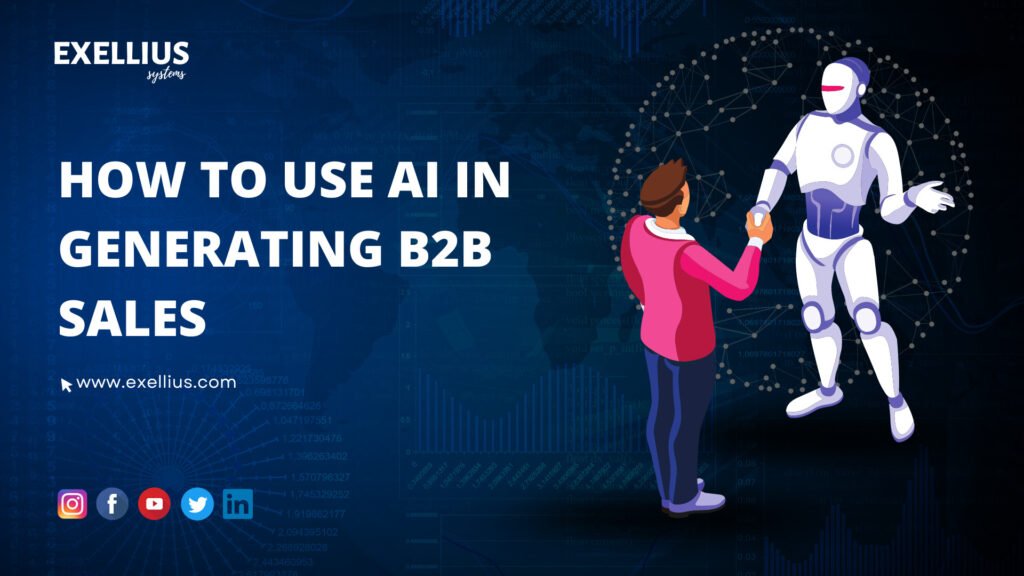
Introduction
In today’s fast-paced business environment, companies need to leverage every tool available to stay ahead of the competition. One of the most powerful tools at your disposal is b2b sales artificial intelligence (AI), which can help you automate and streamline your sales process to drive more revenue and improve customer satisfaction.
But how exactly can you use AI in generating B2B sales? In this guide, we’ll explore some of the most effective strategies for leveraging AI. To optimize your sales process and maximize your revenue. Whether you’re just getting started with AI or you’re looking to take your existing AI capabilities to the next level, you’ll find plenty of valuable insights and actionable tips in this guide.
How to use AI in Generating B2B Sales
Here are some of the most effective strategies for using AI to generate B2B sales:
1. Lead Generation
One of the most important aspects of B2B sales is generating high-quality leads. With AI, you can streamline and optimize your lead generation process to identify the most promising prospects and nurture them into paying customers.
Some of the most effective AI-powered lead generation strategies include:
- Natural Language Processing (NLP) for analyzing customer conversations and identifying key buying signals
- Predictive Analytics for identifying high-value leads based on their behavior and demographics
- Account-Based Marketing (ABM) for targeting specific companies or industries with personalized messaging and content
- Chatbots for engaging with prospects in real-time and guiding them through the sales funnel.
2. B2B Sales Forecasting
Another key area where AI can make a big impact is sales forecasting. By analyzing historical sales data and customer behavior, AI can help you predict future sales trends and identify opportunities for growth.
Some of the most effective AI-powered sales forecasting strategies include:
- Machine Learning algorithms for analyzing large datasets and identifying patterns and trends
- Predictive Analytics for forecasting sales based on factors like seasonality, customer behavior, and market trends
- Automated Reporting for generating real-time insights and alerts based on changes in sales performance.
3. B2B Sales Automation
AI can also help you automate many aspects of your sales process, from lead nurturing to customer retention. By using AI-powered tools and platforms, you can free up your sales team to focus on high-value activities while AI takes care of the routine tasks.
Some of the most effective AI-powered sales automation strategies include:
- Email Marketing Automation for sending personalized, targeted messages to prospects and customers
- Sales Funnel Automation for automating the sales funnel and guiding prospects through the buying process
- Customer Retention Automation for identifying and engaging with customers who are at risk of churning
- Chatbots for providing 24/7 customer support and answering common questions.
4. Personalization
Finally, AI can help you personalize your sales process to better meet the needs and preferences of individual customers. By analyzing customer data and behavior, AI can help you tailor your messaging, content, and offerings to each customer’s unique needs and preferences.
Some of the most effective AI-powered personalization strategies include:
- Recommendation Engines for suggesting products or services based on a customer’s past behavior and preferences
- Content Personalization for customizing website content and messaging based on a customer’s demographics and behavior
- Dynamic Pricing for adjusting prices in real-time based on factors like demand, inventory levels, and customer behavior.
FAQs
Q: Is AI really necessary for B2B sales?
A: While AI is not strictly necessary for B2B sales, it can provide a significant competitive advantage by automating and streamlining various aspects of the sales process. By leveraging AI-powered tools and platforms, you can generate high-quality leads, forecast sales trends, automate routine tasks, and personalize your sales process to better meet the needs and preferences of your customers.
Q: How can I get started with using AI for B2B sales?
A: Getting started with AI for B2B sales can seem daunting, but there are many resources available to help you get started. Consider attending webinars or conferences on the topic, or hiring a consultant or agency that specializes in AI-powered sales. Additionally, many AI-powered sales tools and platforms offer free trials or demos, allowing you to test them out and see how they can benefit your business.
Q: What are some common challenges associated with using AI for B2B sales?
A: While AI can provide many benefits for B2B sales, there are also some challenges associated with its use. These include the need for specialized technical expertise, the risk of relying too heavily on AI and losing the human touch, and concerns around data privacy and security. To overcome these challenges, it’s important to work with experienced AI professionals, establish clear guidelines and protocols around AI usage, and prioritize data privacy and security in all aspects of your sales process.
Q: How can AI help with customer retention?
A: AI can help with customer retention by analyzing customer data and behavior to identify customers who are at risk of churning, and taking proactive steps to engage with them and address their concerns. AI-powered customer retention tools can also provide personalized recommendations and incentives to encourage customers to stay loyal to your brand.
Conclusion
AI has the potential to revolutionize the B2B sales process, helping companies automate and streamline various aspects of sales to generate more revenue and improve customer satisfaction. By leveraging AI-powered lead generation, sales forecasting, sales automation, and personalization tools. You can optimize your sales process and stay ahead of the competition. With the right strategies and tools in place, you can take your B2B sales to new heights and achieve your business goals with greater efficiency and effectiveness.



